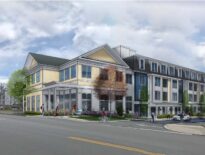
A sculler on the Charles River rows past Harvard University at sunrise. Unlike officials in Brookline, Somerville and Boston, Cambridge leaders passed on a chance to send a rent control bill to Beacon Hill last year. iStock photo
Is it time to put aside the old schtick about the “People’s Republic” of Cambridge?
We’ll see, but when it comes the debate over what to do about skyrocketing rents, a strange thing has been happening over in Cambridge.
Boston Mayor Michelle Wu filed her long-awaited plan to cap rent increases a year ago last January, with the City Council duly passing it a few months later by a vote of 11-2.
Following suit, the Somerville City Council last month unanimously passed its own home rule petition in favor of rent control, with Town Meeting voters in Brookline passing their own rent control proposal in November.
While all these proposals will have to be passed by the state legislature in order to take effect – and the odds of them getting the nod from Beacon Hill are long – they were all the product of months of deliberation, debate and ultimately a vote in their respective communities.
Simply put, bringing back rent control was a big issue for elected leaders, voters and activists in Boston, Somerville and Brookline in 2023.
But in Cambridge, which has its very own Peace Commission and is spending millions of dollars on a universal income pilot project, there has been little or no debate on the hot-button issue.
A Past Too Divisive to Revisit
The silence, as they say, has been deafening.
City councilors quoted in a recent piece on the topic in the Harvard Crimson, which has been ramping up its coverage of Cambridge, including die-hard progressives, expressed wariness and reluctance over reopening a debate that was the cause of such bitter acrimony years ago, especially given state legislators’ apparent hostility to the idea.
City Councilor Paul Toner, who said he is opposed to bringing back rent control, offered up a similar take when I caught up with him last Thursday afternoon.
A moderate Democrat, Toner jokes that makes him the conservative on the City Council.
“An awful lot of people in Cambridge who remember how divisive rent control was here in Cambridge don’t want to reopen it,” Toner said.
So, what made it so divisive?
Certainly, landlords didn’t like the constraints. An all-powerful rent control board decided whether property owners could raise rents, making it difficult to even recoup money spent on basic repairs, let alone improvements.
That led to a deterioration in the condition and quality of Cambridge rental buildings, or so landlords have argued – although how bad it was remains in dispute, with activists arguing it wasn’t as bad and that apartments remained affordable, even if they weren’t all bright and beautiful.
A System Easily Gamed
Yet, affordable to whom? For the biggest bone of contention was that the system was too easily gamed, with the well- and politically-connected managing to land and hang onto coveted rent-controlled units for years, even if they were making more than enough to rent an apartment on the regular market.
There are allegations that state representatives and even a local public radio chief were unfairly benefiting from the system.
News that Kenneth Reeves, then the mayor of Cambridge, had been living in the same, $421-a-month rent controlled apartment for two decades provided critics with a huge talking point, with Massachusetts voters opting to abolish rent control in a 1994 statewide ballot.
But along with not wanting to reopen old wounds, city councilors in Cambridge also appear to have found what they believe to be a more pragmatic strategy to combating crazy rents: revving up construction of new apartments.
Toner and other city councilors have embraced the idea that boosting housing production, especially of affordable units, is the best way to make progress after years of underbuilding.
“I guess I am a little bit surprised it hasn’t come up,” said Toner of the rent control issue. “Most of us on the council feel the way we are going to lower the cost of housing is to build more housing and try to support rezoning and considering different parts of the city for different heights.”

Scott Van Voorhis
What Really Drove Up Rents
Of course, supporters of bringing back rent control are unconvinced by such arguments, even if they agree that more housing is desperately needed.
And in their view, the surge in rents in the years and decades since rent control was repealed simply proves their point and demonstrates the need for government intervention.
But if there was a mistake made with the abolition of rent control, it was that little if any steps were taken to remove the many onerous restrictions weighing down the ability of developers and builders to meet rising demand to live in Cambridge with new apartments, condominiums and townhomes.
The demise of rent control led to an influx of investors looking to capitalize on the city’s newly freed rental market. The local zoning and regulatory restrictions – combined with fear of change and strong NIMBY sentiment – ensured that money would be funneled into existing properties, not new ones.
It’s taken years for Cambridge to figure out that the key is expanding the housing market, not restricting it. And it’s likely to take years more for enough new apartments and condos to come online to make a significant dent.
That’s something the return of rent control would likely jeopardize.
Scott Van Voorhis is Banker & Tradesman’s columnist and publisher of the Contrarian Boston newsletter; opinions expressed are his own. He may be reached at sbvanvoorhis@hotmail.com.




 |
| 

